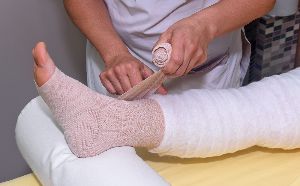A Guide to Lymphedema & Treatment

When your lymph nodes work smoothly, they tend to go unnoticed. These clusters of cells are part of the immune system. They’re located throughout the body and work to filter out waste and excess fluids. However, damage or loss of lymph nodes can lead to a chronic health condition known as lymphedema. This guide explains more about this condition and how it can be managed.
What Is Lymphedema?
Lymph vessels travel through the fatty tissues that lie under the skin’s surface, controlling the flow of fluids through the body. Under normal circumstances, the liquid they collect is eventually returned to the bloodstream. If you have lymphedema, blockages prevent normal flow, and the fluids gradually build up.
The condition is usually isolated to a single arm or leg, though it can occur anywhere on the body. It often stems from cancer treatments that left scarring on the surrounding tissue or surgeries that affected nearby lymph nodes.
What Are Some Common Symptoms?
Lymphedema is primarily characterized by the swelling and hardening of the affected limb. The skin can become irritated or grow thick and lose sensitivity. Most patients experience a loss of flexibility and say the area feels heavy and full. In later stages, the swollen area is prone to infection and blistering.
How Is It Treated?

Although lymphedema can’t be cured, discomfort can be alleviated, and the swelling can be curbed. Doctors use a combination of exercises, special massage techniques, and compression wrapping to encourage the drainage of fluid buildup.
Complex Decongestive Therapy (CDT) is a long-term treatment aimed at guiding patients toward self-care. It uses all of these methods, in addition to utilizing compression garments and skin care guidance. It also includes semiannual maintenance appointments to ensure the program remains effective.
How Can Acupuncture Help?
In addition to other therapies, studies have shown that traditional acupuncture is effective at reducing swelling in affected limbs. This helps patients recover mobility and range of motion, which can make them more capable of performing day-to-day tasks. The improvements last up to four months after the acupuncture is performed, making it a nondemanding addition to an existing lymphedema treatment schedule. Since there are concerns of infection and skin problems in lymphedema patients, these treatments should only be performed by certified acupuncturists in a clinical environment.
If you’re searching for a skilled therapist to help treat your lymphedema, reach out to Avicenna Acupuncture & Lymphedema Clinic in Wheat Ridge, CO. While their treatments should not be used as a replacement for professional care, they can provide relief and support. Certified Lymphedema Therapist Petra Schalk has been serving patients in the Denver Metro area since 2009. She is also a certified garment fitter, and she can guide you through all the steps of CDT and help you build an ongoing care routine. Call (303) 803-0675 to book an appointment, and visit the website to learn more about how this facility approaches lymphedema education and treatment.
About the Business
Have a question? Ask the experts!
Send your question

